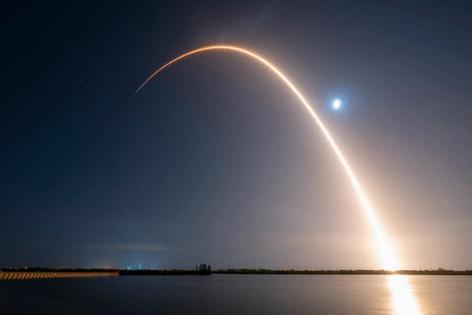What feud? SpaceX launches competitor Amazon's Project Kuiper satellites
Published in Business News
Just because Elon Musk and Jeff Bezos aren’t the best of friends and Amazon’s Project Kuiper will directly compete with SpaceX’s Starlink satellites for broadband internet doesn’t mean everyone can’t get along.
A SpaceX Falcon 9 rocket launched at 2:30 a.m. Wednesday with 24 of Amazon’s satellites from Cape Canaveral Space Force Station’s Space Launch Complex 40. The first-stage booster flew for the first time and landed downrange on the droneship A Shortfall of Gravitas.
This was the first launch of Amazon’s satellites for SpaceX with the two previous missions with operational versions of the satellites having been sent up by United Launch Alliance on a pair of Atlas V rockets earlier this year.
Amazon initially avoided SpaceX when it doled out the launch contracts for what is aiming to be more than 3,200 satellites in its constellation, instead relying mostly on ULA buying up all of that company’s remaining Atlas V rockets as well as dozens more on ULA’s new Vulcan rocket. It also gave contracts to Bezos’ Blue Origin to fly on New Glenn and European launch service provider Arianespace with its Ariane 6 rocket.
Amazon, though, was backed into a corner as Vulcan, New Glenn and Ariane 6 faced delays, and the Federal Communications Commission license for the Project Kuiper constellation required at least half of the satellites to be launched by July 2026.
So SpaceX with its readily available Falcon 9 joined the launch party.
This batch of 24 adds to the 27 each flown by the Atlas V missions bringing the total to 78 so far, which is just beginning to inch toward the 1,600 target within the next year. The full 3,236-satellite constellation is meant to be launched by July 31, 2029.
Meanwhile, SpaceX continues to grow its massive Starlink constellation having launched more than 8,000 so far.
ULA has six more Atlas V launches set to add to that growing total as well as its first Vulcan launches for Amazon set to fly later this year. No dates have yet to be announced for the Blue Origin or Arianespace missions. Vulcan, New Glenn and Ariane 6 all have larger capacity than Atlas V or Falcon 9, so could speed up the pace when operational.
SpaceX has been contracted for two more Falcon 9 launches for Amazon.
For its part, Amazon has built a satellite processing facility at the former space shuttle landing site at Kennedy Space Center to speed up the availability of its satellites once they are shipped to the Space Coast from Amazon’s manufacturing facilities in Washington.
The Wednesday launch marked the 61st overall on the Space Coast for 2025 with all but three coming from SpaceX.
©2025 Orlando Sentinel. Visit at orlandosentinel.com. Distributed by Tribune Content Agency, LLC.












Comments